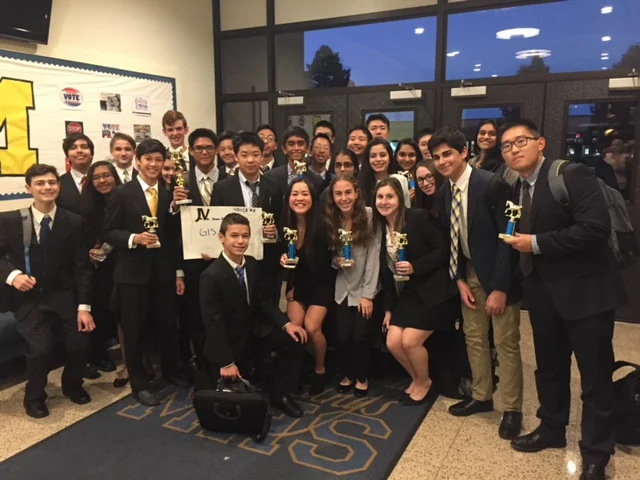Please see this Event Guide for more information on all events.
There are three main forms of debate in which our team competes: Congress, Lincoln-Douglas, and Public Forum. All the information below is provided by the National Speech and Debate Association. Please click here to see more information (including videos and topic examples).
Please click here for more in-depth descriptions of all events.
Congressional Debate
Congressional Debate Captains: Rayna Batreja, Caroline Cheng, Grace Gu, and Bernice Zeng
Congressional Debate is like a simulation of the real United States legislature. A group of 10-25 students, called a Chamber, will compete in a legislative session. A series of bills and resolutions will be proposed by students from various schools. Students in turn will be selected by a presiding officer — a student elected to conduct the business of the round — to give speeches both advocating for and encouraging the defeat of the measure in front of them. Following each speech, competitors will be able to pose questions of the speaker. Once debate is exhausted on a particular item, the chamber will vote either to pass or fail the legislation, and debate moves on to the next item.
Legislation comes in two types — a bill and a resolution. A bill is a plan of action, detailing how a particular policy proposal will be implemented. A resolution, meanwhile, is a statement expressing the opinion of the chamber.
Typically, one session of Congress lasts about 2-3 hours. During that time, students typically give speeches 3 minutes in length. The first two speeches on a piece of legislation are known as the first advocacy, or first pro, and the first rejection, or first con. These speeches are followed by 2 minutes of cross-examination. After the first pro and con speech are established, each additional speaker is subject to one minute of cross-examination by the chamber.
Lincoln-Douglas Debate
Lincoln Douglas Captains: Renee Ding, Leyi Han, Maxwell Mao, and Andrew Zhang
In this one-on-one format, students debate a topic provided by the National Speech & Debate Association. Topics range from individual freedom versus the collective good to economic development versus environmental protection. Students may consult evidence gathered prior to the debate but may not use the internet in rounds. An entire debate is roughly 45 minutes and consists of constructive speeches, rebuttals, and cross-examination.
Lincoln-Douglas Debate typically appeals to individuals who like to debate, but prefer a one-on-one format as opposed to a team or group setting. Additionally, individuals who enjoy LD like exploring questions of how society ought to be. Many people refer to LD Debate as a “values” debate, as questions of morality and justice are commonly examined. Students prepare cases and then engage in an exchange of cross-examinations and rebuttals in an attempt to convince a judge that s/he is the better debater in the round.
Public Forum Debate
Public Forum Captains: Ryan Chen, Vidushi Sinha, Nicky Wang, and Matthew Xia
Originating as the "layman's debate event", competitors debate an issue of national/contemporary importance, ideally to appeal to the common person. Public Forum involves opposing teams of two, debating a topic concerning a current event. Proceeding a coin toss, the winners choose which side to debate (PRO or CON) or which speaker position they prefer (1st or 2nd), and the other team receives the remaining option. Students present cases, engage in rebuttal, refutation and also participate in a “crossfire” (similar to a cross-examination) with the opportunity to question the opposing team. Often times community members are recruited to judge this event.
